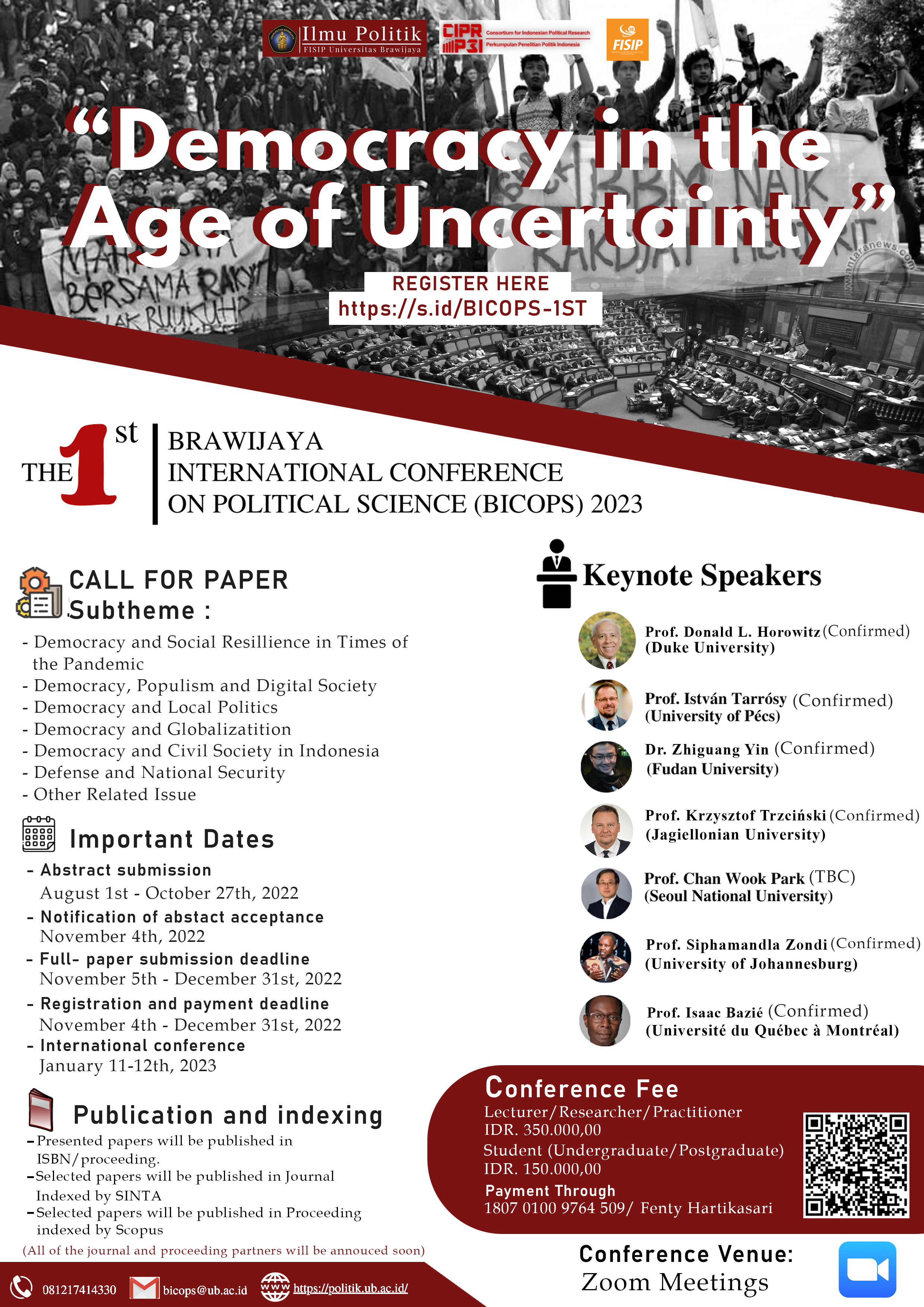1 st Brawijaya International Conference on Political Science (BICOPS)

Call for Papers
1st Brawijaya International Conference on Political Science (BICOPS)
Malang, Indonesia
January, 11-12, 2023
The COVID-19 pandemic, which has plagued the world since the beginning of 2020, has sent shockwaves around the world. Almost everyone in the world experiences changes in the structure, order, and social, economic, and political life. Social panic, economic shock, psychological trauma, political crisis, and uncertainty have all resulted from the pandemic. The coronavirus has had a direct impact on many aspects of democracy around the world, from election postponement to crackdowns, arrests, and torture of protesters to the use of military force and coups to resolve old conflicts and consolidate power (USGLC, 2020). Democracy had previously been threatened and suffered a global setback. This threat has been exacerbated by the pandemic, which has resulted in a state of emergency, the spread of false information, and restrictions on free speech and independent media (International IDEA, 2021).
Countries all over the world are dealing with difficult conditions as a result of the pandemic. Mobility between countries has ceased as countries, one by one, imposed lockdowns and quarantines that have brought normal life to a halt. The pandemic has exacerbated a number of other social and political issues, including racial injustice, human rights violations, and the general deterioration of democracy. At the same time, the pandemic has exposed many inequalities in modern society and raised fundamental issues in social life. As a result of the pandemic, contemporary society's problems have gotten worse. Global democracy has deteriorated in 80 countries, according to Freedom House's (2020) records. To summarize, the pandemic poses new challenges to democracy. On that basis, it is critical to investigate the socio-political impact and public reaction to state governance in response to COVID-19.
The push for the opening of democratic political space and access to greater social equality has stalled during the pandemic period between 2020 and 2022. Rising inequality has become a critical challenge with significant implications for the resilience of world democracies, as most countries tend to produce a single narrative in dealing with the pandemic, namely by concentrating all repressive forces on the state and its government. On the other hand, the pandemic's impact has exacerbated the situation in countries that have previously experienced democratic erosion. This condition gave birth to and enabled powerful elites to make policy and make decisions in unprecedented times, resulting in uncertainty. The real threat to democracy appears to be the future of global politics, with the strengthening of autocracy and authoritarianism in various countries with political vulnerabilities and instability.
Given the pandemic's impact on world democracy, we invite researchers, academics, students, activists, and practitioners to discuss it from various perspectives at an international conference titled "Democracy in the Age of Uncertainty." The conference's goal is to find answers to important questions about democracy and how resilient society was during the pandemic, democracy, populism, and the digital society, democracy and local politics, democracy and globalization, democracy and civil society in Indonesia, defense and national security, and other related topics.
1. Pandemic Democratic Resilience and Social Resilience
2. Populism, Democracy, and the Digital Society
3. Local Politics and Democracy
4. Globalization and Democracy
5. Indonesian Democracy and Civil Society
6. Defense and National Security
7. Other relevant issues
Venue
1st Brawijaya International Conference on Political Science (BICOPS) will be held virtually on January 11-12, 2023, the Department of Political Science, Faculty of Social and Political Sciences, Universitas Brawijaya
The conference's official languages will be English.
All accepted and presented papers will be assigned an ISBN number. The proceedings and selected papers will be published in ISBN proceedings/journals that are Scopus-indexed.
Important Date :
Abstract Submission: August 1st – October 27th, 2022;
Abstract Acceptance Notification: November 4th, 2022
Deadline for full paper submission: November 5th - December 31st, 2022
January 11-12th, 2023, International Conference
Keynote Speakers:
1. Professor Donald L. Horowitz (Duke University)
2. Prof. Istvan Tarrosy (University of Pecs)
3. Dr. Zhinguang Yin (Fudan University)
4. Prof. Krzysztof Trzcinski (Jagiellonian University)
5. Prof. Chan Wook Park (Seoul National University, TBC)
6. Prof. Siphamandla Zondi (University of Johannesburg)
7. Prof. Isaac Bazie (Universite du Quebec a Montreal)
Conference Fee :
- Lecturer/Researcher/Practitioner: IDR. 350.000
- Student (Undergraduate/Postgraduarte) : IDR.150.000
*Payment through BRI number 180701009764509 (Fenty Hartikasari)
TEMPLATE FULL PAPER:
https://s.id/TEMPLATE-FULLPAPER
Tinggalkan Komentar
Alamat email Anda tidak akan dipublikasikan. Ruas yang wajib ditandai *